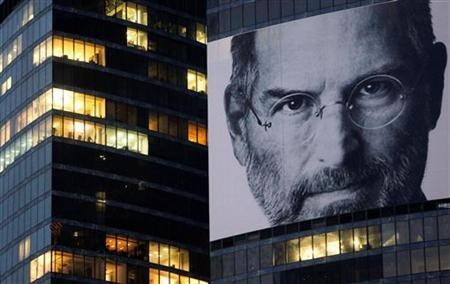Why Steve Jobs Doesn't Deserve to be Time Magazine's Man of the Year
OPINION

With the cat-out-of-the-bag that Apple's deceased co-founder Steve Jobs has been posthumously nominated for Time magazine's 2011 Person of the Year, the IBTimes takes you through the key reasons why the tech-guru doesn't deserve to win.
The Nomination
Jobs was nominated for the award by NBC Nightly News anchor Brian Williams.
"Not only did he change the world, but he gave us that spirit again that something was possible that you could look at a piece of plastic or glass and move your finger-- that's outlandish.
"You could make things bigger or smaller like that. 'Oh the places you'll go' and oh the way you will change forever the music and television industries. So may he rest in peace, Steve Jobs, and the spirit he represents, are my nominee for Person of the Year," said Williams in his ode-to-Jobs nomination speech.
While Williams' comment holds true for Jobs' life as a whole, it doesn't when you look at his contributions to the world this year.
The Competition
The fact is, while Steve Jobs was undoubtedly a tech genius that helped shape the world as it is, he didn't actually do anything of real note this year.
Prior to his death Jobs had spent the majority of his time battling cancer. As noted by numerous media outlets the effects of the disease on him were obvious with his weight plummeting and his face looking increasingly gaunt.
As a result it's unsurprising that his contribution to Apple waned. Before he died he was even forced to step down from his role as Apple's CEO, handing the reigns to Tim Cook.
His competition for the award however have all been incredibly busy.
Alongside Jobs other nominees for the award include, U.S. Senate candidate Elizabeth Warren, Mohamed Bouazizi, populists and "angry people."
Mohamed Bouazizi for example, a humble street vendor, is credited as being one of the primary catalysts that ignited the Tunisian Revolution. Bouazizi set himself on fire in December 2010 to protest the confiscation of his wares and harassment and humiliation subsequently inflicted on him by a corrupt municipal official and her aides.
The public backlash and rage at Bouazizi's treatment and death is credited as a key moment in the subsequent revolution that forced the country's then-President Zine El Abidine Ben Ali to step down on 14 January 2011.
Likewise the populist and "angry people" nominees have also been busy trying to change the world.
Both nominations referred to participants in the Arab Spring, Occupy Wall Street, and Tea Party movements. While the two groups don't refer to a single person, but a group of people, they both represent a group of people, like Bouazizi, fighting to make the world a better place.
A Lifetime of Achievement
The point of this article isn't to say Steve Jobs didn't contribute a huge amount to the world, just that he didn't do it this year.
Jobs undoubtedly deserves the accolades and awards he's received since his death. But, that doesn't mean he is the man of the year. When judged on his contributions to the world this year, Jobs had understandably done very little compared to the other nominees.
The award is 2011's person of the year, it isn't a lifetime award. For this simple reason alone, given the competition, Jobs shouldn't win the award.
© Copyright IBTimes 2025. All rights reserved.





















